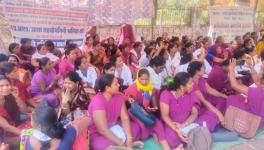COVID-19: MVA Government Falls Back, Eases Restrictions after Shopkeepers Defy Rules
Thousands of shopkeepers in Pune opened their shops, defying restrictions imposed by the state government in light of COVID-19, leading to the MVA government falling back. The shopkeepers argued that Pune had tided over the second wave of the pandemic and that the administration was dithering over re-opening markets. The state government finally gave in, coming up with a new set of rules for Pune whereby shops could remain open between 8 am to 10 pm. Eateries will also be allowed to function during the period.
"There is no business. Hundreds of smaller and medium shopkeepers have been reduced to tears. We will follow COVID-19 norms but allow us to open our shops. This was our demand. As the government was not listening, many shopkeepers protested by opening their establishments. Public pressure was the only way to convince the government," said Fatehchand Ranka, president of the Federation of Trade Association, Pune.
The second wave of COVID-19 had hit Maharashtra hard. The state government had begun imposing more restrictions by the end of March and a lockdown was announced on April 14. Four months had passed but the restrictions stayed on and businesses suffered.
The capital city of Mumbai is faced with similar issues. On Sunday, Chief Minister Uddhav Thackeray announced that the people who have taken both shots of the vaccine would be allowed to travel in Mumbai's locals from August 15th. This came as a major relief for Mumbai and those living in the suburbs.
Santosh Gangurde is a clerk at Mumbai University. He stays in Nalasopara, Palghar district, hours away from his workplace. However, university employees were not considered essential workers as per the state's list. So, Santosh had to take a bus both ways. "Three hours of travelling to and from the university takes up six hours. The local train would have taken three hours instead; it is good the government took the call," he said.
The decision to allow local trains for those who were fully vaccinated came after social organisations and opposition parties raised it. Sources said that even many Shiv Sena councillors and MLAs told Thackeray about the outcry in public over local trains. "Local body elections in Mumbai and six municipalities around Mumbai will happen within six months. There was anger among the public about transportation. It would have cost the Shiv Sena much. We told our leadership to take the call to ease public anger," said a senior Shiv Sena MLA.
The easing of restrictions, however, come at a time when patients who have contracted the Delta variant is rising – 21 Delta Plus cases in Maharashtra were reported in June and there have been a total of 45 cases so far. The highest number of cases are from Jalgaon district followed by Ratnagiri and Mumbai. The Delta Plus is a mutation of the highly transmissible Delta variant of COVID-19. The first case was found in the state in the second week of June.
The state's biggest festival – Ganesh Chaturthi – falls on September 10. The eased restrictions may see crowds gathering in pandals in bigger numbers. Experts are worried about the rise of cases in days following the festival celebrations. However, public pressure has seen the state budge. "If cases rises again due to these new rules, we will have to go for more restrictions," CM Thackeray warned in his Sunday address.
Get the latest reports & analysis with people's perspective on Protests, movements & deep analytical videos, discussions of the current affairs in your Telegram app. Subscribe to NewsClick's Telegram channel & get Real-Time updates on stories, as they get published on our website.
























